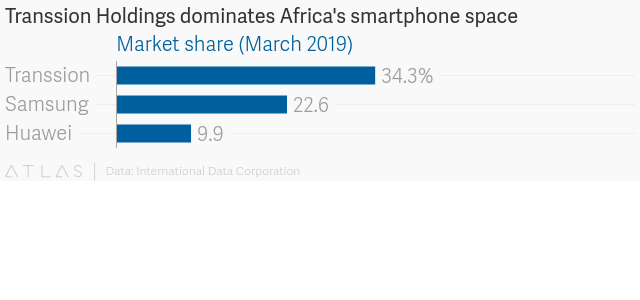Africa’s top phone maker is leading a $40 million investment to win the race for online payments

Shenzhen, China-based Transsion Holdings, Africa’s top phone maker, is joining a crowded field of major international players getting into the continent’s fintech space with the launch of PalmPay.
The payments service is live in Nigeria thanks to a $40 million investment raised from Transsion, Chinese internet giant NetEase and Mediatek, a Taiwan-based communications hardware firm. While not a direct Transsion product, PalmPay is owned by Transsnet—a joint venture firm between Transssion and NetEase.
In addition to the funding, Transsion will offer PalmPay a unique market advantage as the payments app will come pre-installed on Transsion’s mobile phone brands including Tecno, Itel and Infinix. It will be a significant market advantage for PalmPay as Transsion dominates market share for Africa’s mobile phone sales after surpassing Samsung in 2017. The success of Transsion’s mobile brands on the continent is largely thanks to its hyper-focus on manufacturing phones specifically for African users with features including multiple SIM card slots and cameras optimized for darker skin tones. It’s a strategy that also proved potent enough to drive Transsion’s billion-dollar IPO last month in Shanghai.

Having achieved success in the mobile hardware business, powering a payments service bundled on its now ubiquitous phone brands also offers Transsion a recurring revenue stream off its smartphones and a potential share of the billion-dollar online payments market on the continent. In addition to Nigeria, PalmPay will also operate in neighboring Ghana and plans further expansion across the continent next year.
China vs China
PalmPay’s entry into the payments space, particularly in Nigeria, sets it up for a face-off with another China-backed payments service, OPay. Launched in August 2018 after being incubated by Opera, the China-owned web browser, OPay has gained significant traction over the past year. It raised $50 million in funding from a consortium of Chinese investors in July. These are significantly large amounts of early stage funding for the African market and perhaps capture how high the stakes are for the Chinese investors who are likely hoping to replicate the huge and dominant success of AliPay and WeChat Pay in China.
Like PalmPay, OPay will also be riding the coattails of a larger mother-ship company with the Opera the web browser being the second most popular on the continent. But rather than depend solely on media campaigns or organic growth to drive adoption of its service, OPay has launched operations in other verticals, including motorcycle hailing (a fast-growing startup sector in Nigeria), to drive the use of its payments platform among mass market users. Transsion can follow a similar path by incorporating PalmPay into other Transsnet-owned services, including Boomplay, possibly the largest Africa-focused music streaming service.
The possibility of two China-backed payments companies becoming major players in key African markets is in keeping with a wider trend which has seen rise of Chinese presence in Africa, from public infrastructure projects to news and media.
Yet, while they are heavily backed and have unique market advantages, PalmPay and OPay will still face wider competition from several other players, including Interswitch, Africa’s first fintech unicorn, which received a $200 million investment from Visa this week.
With smartphone adoption rising while internet access costs fall (albeit slowly), there’s high-growth potential for online and electronic payments on the continent. It’s a view shared by global payments giants Visa, Mastercard, Stripe and PayPal, all of which have invested in African payments companies in the last 18 months.
Another key player in the space may also come in form of e-commerce giant Jumia which operates in 14 African markets. After building an in-house payments solution for its marketplace, Jumia is now stepping up plans to spin-off its Jumia Pay service beyond its e-commerce ecosystem to power third-party online payment processing as well as mobile point of sale systems likely trying to replicate the success of PayPal.
Sign up to the Quartz Africa Weekly Brief here for news and analysis on African business, tech and innovation in your inbox
Sign up for the Quartz Daily Brief, our free daily newsletter with the world’s most important and interesting news.
More stories from Quartz:

